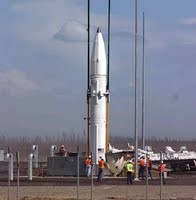In the run-up to NATO's heads of state summit later this month in Lisbon, much of the discussion has focused on questions of the alliance's relevance and identity, with particular attention paid to the alliance's new Strategic Concept to be rolled out in Lisbon. But a more practical issue that will be discussed at the summit is whether to make comprehensive ballistic missile defense (BMD) an alliance-wide mission.
Despite a lack of enthusiasm in Turkey and continuing discontent in Russia and perhaps some other non-NATO countries, NATO governments generally support the Obama administration's phased adaptive approach to European missile defense. The new architecture, which entails bilateral agreements between Washington and select NATO allies near Iran, would cover the territory, population and military forces of all NATO members -- including those already within range of Iranian ballistic missiles.
Washington, however, would like the NATO leaders at Lisbon to match this U.S. contribution to alliance security with a collective commitment to support enhanced BMD cooperation as an alliance mission. This designation would result in the other NATO allies funding at least some of Europe's missile-defense architecture.

